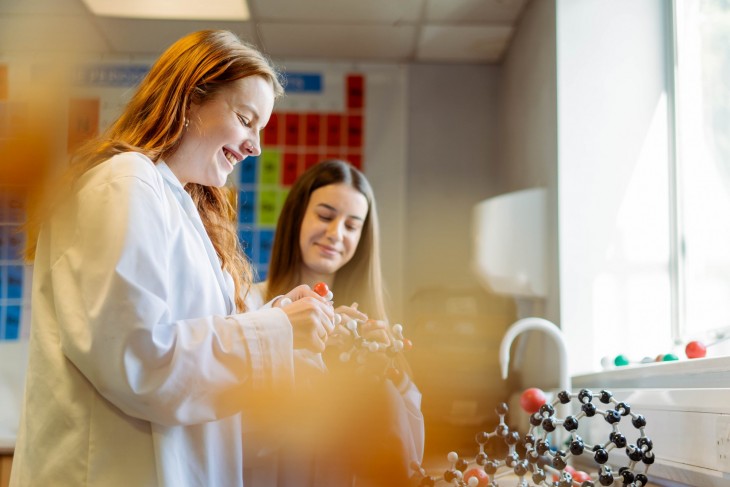Hereford Sixth Form College
Chemistry
Find a course
Chemistry A Level
Chemistry aims to explain the properties of substances in terms of the particles they are made of: atoms, molecules and ions.

A Level Chemistry
What does the course involve?
In this course you will learn a lot of fundamental theory concerning the behaviour of these particles and you will see how this is reflected in the properties of substances and the reactions they undergo.
You will also see the creative side of Chemistry, learning how molecules can be built up and transformed in organic synthesis and you will consider the importance of Chemistry in the real world.

A Level Chemistry has 6 modules.
The A Level exam will consist of 3 written papers covering all of the modules.
There is a considerable amount of maths in A Level Chemistry. The skills you need will have been covered in GCSE Mathematics but you will need to be ready to apply these intelligently and accurately to chemical problems.
There is no practical exam in Chemistry but you will record your experiments as you go through the course and, if you have completed the practicals, picked up some key skills and kept your records, you can be awarded a Practical Endorsement for Chemistry, which is an additional qualification.
Modules
Module 1: Development of Practical Skills.
Laboratory work is an important part of the course and in your final exams you will have to show your understanding of the practical methods you encounter.
Module 2: Foundations in Chemistry.
These are the basic ideas that underpin everything else in Chemistry, including the structure of atoms and the nature of the bonds that can form between them, and how these things are related to the properties and reactivities of substances. You will also learn how to perform key chemical calculations that will be used throughout the course.
Module 3: Periodic Table and Energy.
Here you will learn about trends and patterns of behaviour among the elements in the periodic table. You will also see how the energy changes accompanying reactions can be measured and understood.
Module 4: Core Organic Chemistry.
This introduces the diverse chemistry of carbon compounds. You will learn to understand their structures and reactions and how these things can be investigated.
Module 5: Physical Chemistry and Transition Elements.
This module builds on ideas from module 2, giving further insight into rates of reactions and chemical equilibria and introducing another part of the periodic table.
Module 6: Organic Chemistry and Analysis.
This module is the sequel to module 4, introducing a much wider range of organic reactions and more powerful methods of structure determination.
Please note: /404Certificate in Mathematical Studies must be studied alongside this course, unless you are also studying Mathematics or Statistics.
What can you do after the course?
Chemistry is essential, or at least desirable, for a wide range of higher education science courses. In addition to Chemistry, this would include Medicine and Veterinary Medicine, as well as many related courses such as Biochemistry, Pharmacy and Biomedical Science as well as material science and nanotechnology. Chemistry is also highly regarded as a basis for any non-scientific course or career.
For those who are interested in pursuing a career in Medicine, Veterinary Medicine, or Dentistry, the College has a dedicated programme providing support and guidance. For more information, /404click here.